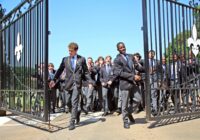25 January 2023
Dear Parents,
Our matric results from the class of 2022 are a wonderful accolade for us to add to the successes of our 150th year. I salute every teacher who spent hours and hours in dedicated teaching of our boys and every boy who put his shoulder to the wheel to achieve these results. Our team is professional, committed and determined to give your son the best chance of success in achieving his best results. Every school chooses to publish aspects of their results in a multitude of ways; we believe in the principle of “less is more” despite the temptation to flaunt our success.
Great results are especially rewarding both to learner and teacher, as they reflect an understanding in the learning process which wholeheartedly satisfies both parties. Included in the euphoria of brilliant results are those of the boys who battled it out behind a desk when this was not his happy space; many boys learnt to knuckle down and acquire the skills to complete an exam despite the struggle of academic rigour.
Exams are, however, a somewhat blunt instrument in the measurement of learning. Although they remain an important yardstick in our assessment of learning, they are, by nature, narrow instruments. The move towards a fairer, broader measurement of learning is the subject of ongoing research and is especially important in our collective endeavour to hone a system that is more thorough, less narrow and more encompassing of a reflection of skills acquired and mastered.
The adolescent is a fascinating subject; those who are male have certain traits that are especially intriguing and present a set of challenges which are both exciting and bewildering, often at the same time.
Research continues to be conducted about brain development and physical development in young people. It is very exciting work. A modern approach to learning must build on the knowledge of the past, and indeed embrace the good in that, but also forge new methodologies that ensure the ongoing advancement in learning strategies.
For the young male, especially, engagement in his learning is an absolute requirement. Cultivating personal agency in his learning is one of the keys to this engagement. This is not a new concept, however, with the advent of technology and more and more instant gratification in our world, the ability to stay focussed on a text (not an SMS nor WhatsApp text) or a quiet subject for study has become even more challenging. Finding and employing ways to master this technique seems to be more important. Boys, often less compliant in a classroom, must work particularly hard at this – especially in their early teens.
Our world continues to gallop forward in leaps and bounds with seemingly no slowing down in sight. Exciting as this is, we need to ensure that our children are equipped to participate in shaping the changes set to come. Their application and manipulation of knowledge, in the knowledge economy, becomes a critical skill.
In Richard Reeves’ recent book, Of Boys and Men, the case is made for targeted interventions at schools to ensure boys are not left behind in the learning process when much of schooling success, as we know it today, is more easily achieved by girls at an earlier age. Generalisations are often dangerous, but trends are important to observe in order to act wisely for those in our care.
The Independent Examinations Board produces an interesting comparative statistic on the results of boys and girls separately for each subject. Last year’s results show (once again) clear statistics in favour of girls’ achievements, especially in languages. But, more tellingly, the only subjects wherein boys achieved a marginally higher average mark were Mathematics, Physical Sciences and Economics; in every other subject, the girls’ average outdid the boys. This is especially significant for those of us who work in monastic schools.
In light of these national trends, our aim must be to find ways to ensure even greater engagement of our boys in their mastery of their learning. Our teachers, whilst under pressure to cover syllabi, are always trying to find ways that draw the best out of our boys in ways that ensure greater agency from the boys. However, as you and I can probably attest, the lights of learning often only come on later in life, especially for boys who love a score more than an intricate equation or beautiful metaphor. Our ongoing task then, in educating young men, is to devise plans to grow their desire to understand and to learn. This must be far more than “only” achieving a good exam result, important as this is. Valuable learning must excite the learner and teach them the value of understanding and of knowing a skill or a fact, such that the foundation of learning is solid.
The joy of an exuberant, boisterous class of boys is even more rewarding when boys make every effort to understand the work being taught; it is indeed the excitement and hope of our young people that encourages us to continue giving, as we are challenged to perpetuate hope and to uphold a steadfast belief in the promise of this next generation of academics, entrepreneurs, problem-solvers, and professionals.
The learner and the teacher are entwined in the dance of knowledge acquisition and in the mastery of concepts. It is a beautiful dance – let’s allow this to thrive.
Kind regards,

George Harris
Headmaster





